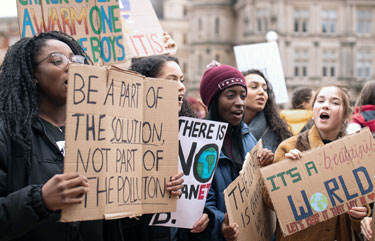Saturday’s National Public Health Week celebrations are focused on taking actions for equity on climate change. According to Katherine Catalano, MS, deputy director of APHA’s Center for Climate, Health and Equity, author of today’s guest post, everyone has a role to play in addressing climate change. Working together can build community and support.
In the midst of a climate crisis, with dire news coming from scientists and health advocates every day, it’s easy to feel overwhelmed and powerless. These feelings have been especially acute since the latest report from the Intergovernmental Panel on Climate Change, which warns of extreme heat and weather events, water scarcity, food insecurity, vector-borne diseases and flooding that will affect billions of people.
Looking for renewed hope and inspiration after receiving this sobering news, I attended the American Climate Leadership Summit last week. There I heard from a diverse group of climate leaders and innovators who reminded me that there is space for both outrage and optimism in the conversation around climate, health and equity. Decades of inaction have led to a reality in which we have no choice but to act, especially as historically marginalized populations in low-income communities and communities of color are continuing to bear disproportionate burdens of climate change, but we can also find hope in the exciting work being done on the frontlines of this crisis and in the passion of our fellow advocates for climate and health. 
Natasha Sood, MPH, co-founder of Medical Students for a Sustainable Future reminded me during Wednesday’s closing keynote that we can find the support we need by joining together with our peers and working to amplify one another’s efforts in whatever ways we can. Everyone has something to contribute to this movement. Here are some ways you can get involved:
• Give time: Find a local group working toward climate justice and join it to help build public support and amplify the cry for equitable climate solutions. Become part of an online community by training to become a Climate for Health Ambassador. If you’re a student, get involved in an on-campus community and apply for one of APHA’s Student Champions for Climate Justice Awards.
• Give money: Donate to nonprofit organizations and community groups. Invest in renewable energy and climate adaptation technologies and engage in investor advocacy.
• Apply research: Conduct research, collect local data and work with impacted communities.
• Share knowledge: Share news, resources and opportunities for action with your followers, peers or networks. When it comes to climate and health, we all have a story to tell and a stake in this fight. When telling yours, remember it’s particularly important to uplift voices from communities of color and others who will most be affected by climate change.
• Advocate: Write op-eds and letters to the editor and share them with local news outlets. Contact your elected officials and ask what they’re doing to advance climate justice and achieve equitable health outcomes. Share your climate and health story in one of APHA’s Tiny Climate Chronicles.
We all have resources that we can offer to help push our society toward a healthier, more resilient and ultimately a survivable future. Coming together in local communities can provide the hope and support we need to keep going whenever these challenges feel insurmountable.
In recognition of NPHW's climate change focus tomorrow, I challenge you to take at least one of the actions above and tweet about it using the #ClimateChangesHealth hashtag.
Photo by Callum Shaw, courtesy Unsplash